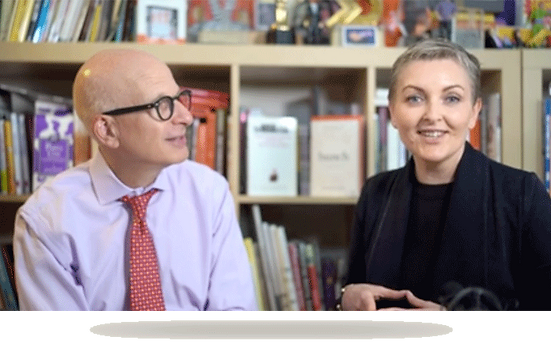The Story Savants: How Bernadette Jiwa and Seth Godin Are Revolutionising Business Through Storytelling
Your small business has a unique story to tell. It's a story that no big corporation can replicate.

In the grand narrative of modern marketing and branding, two names consistently emerge as the protagonists of a powerful plot twist: Bernadette Jiwa and Seth Godin. These thought leaders have become the storytellers of storytelling itself, evangelising the power of narrative in business with such fervour that they've sparked a revolution in how companies, especially small businesses, approach their marketing.
But who are these story savants, and why should small business owners sit up and take notice? Grab your favourite notebook (or digital device), as we dive into the world where business meets narrative, and discover how Jiwa and Godin are rewriting the rules of engagement for brands of all sizes.
The Storytellers' Tales: Meet Jiwa and Godin
Before we explore their philosophies, let's set the scene with a brief introduction:
Bernadette Jiwa is an Australian brand storytelling coach and author of several books including "Story Driven" and "Marketing: A Love Story." Known for her insights on brand storytelling and customer-centric marketing, Jiwa helps businesses find and tell their unique stories.
Seth Godin, an American author and former dot com business executive, has written 19 bestselling books including "This is Marketing" and "All Marketers Are Liars Tell Stories." Godin is known for his innovative ideas on marketing, leadership and the ways ideas spread.
The Plot Thickens: Why Storytelling Matters in Business
Both Jiwa and Godin argue that in a world saturated with products and services, it's not enough to simply have a good offering—you need to have a good story.
Bernadette Jiwa emphasizes the importance of story in creating meaning for customers. In her book "Marketing: A Love Story," she writes, "Marketing is not about selling more stuff to more people more often. It's about creating meaning and mattering to your customers."
Seth Godin, on the other hand, focuses on how stories can spread ideas. In his book "All Marketers Are Liars Tell Stories," he states, "Marketing is no longer about the stuff that you make, but about the stories you tell."
But why is storytelling so crucial? Let's break down the key reasons according to our story savants:
- Emotional Connection: Stories evoke emotions, and emotions drive decisions.
- Differentiation: In a crowded marketplace, your story sets you apart.
- Memorability: People remember stories long after they forget facts and figures.
- Trust-Building: Stories humanise your brand and foster trust.
- Value Creation: A good story can add perceived value to your product or service.
The Jiwa Jive: Bernadette's Approach to Brand Storytelling
Bernadette Jiwa's approach to storytelling centres on what she calls "the difference map."
This involves understanding:
- The change you want to make.
- The people you want to change.
- Their worldview and what they believe now.
- The story you need to tell to change what they believe.
- The tools you will use to tell that story.
Small Business Application: A local organic farm could use Jiwa's difference map like this:
- Change: Encourage more people to eat locally grown, organic produce.
- People: Health-conscious families in the local community.
- Current worldview: Organic produce is expensive and inconvenient.
- Story to tell: How eating local, organic produce is not only healthier but can be affordable and convenient.
- Tools: Farm tours, cooking classes, community-supported agriculture (CSA) program.
Jiwa emphasises the importance of understanding your customers deeply. As she says:
"When you have insight and empathy, you have everything you need to create better products, services, marketing and customer experiences."
The Godin Gospel: Seth's Take on Marketing Narratives
Seth Godin's approach to storytelling in marketing is encapsulated in his concept of "permission marketing" and his emphasis on creating and leading "tribes."
Godin argues that the best stories are those that resonate with the worldview of a specific group of people—your tribe. He encourages businesses to focus on being remarkable (literally, worth remarking about) rather than trying to appeal to everyone.
Small Business Application: A local bookstore could apply Godin's principles by:
- Identifying their "tribe" (e.g. lovers of classic literature).
- Creating content that speaks directly to this group's interests and worldview.
- Building a community around these shared interests (e.g. a monthly book club).
- Consistently delivering remarkable experiences that people want to talk about.
The Storytellers' Toolkit: Practical Tips from Jiwa and Godin
Drawing from the wisdom of both thought leaders, here are some practical storytelling tips for small businesses:
- Know Your 'Why': Both Jiwa and Godin emphasise the importance of understanding and communicating your purpose. Why does your business exist beyond making money?
- Focus on Your Customer: Jiwa often says, "It's not about you, it's about them." Centre your story on how you help your customers, not just on what you do.
- Be Authentic: Godin warns against trying to deceive people with your marketing. Tell true stories that match your brand's values.
- Create Emotional Connections: Both experts stress the power of emotion in storytelling. What feelings do you want your brand to evoke?
- Show, Don't Just Tell: Use concrete examples and sensory details in your stories to make them more vivid and engaging.
- Embrace Your Uniqueness: As Godin says, "In a crowded marketplace, fitting in is a failure. In a busy marketplace, not standing out is the same as being invisible."
- Consistency is Key: Ensure your story is consistent across all touchpoints. As Jiwa notes, "Your story isn't just what you tell people, it's what they believe about you based on the signals your brand sends."
The Plot Twist: Measuring the Impact of Your Story
While both Jiwa and Godin focus on the art of storytelling, they also recognise the importance of measuring its impact. Here are some metrics they suggest:
- Engagement: Are people interacting with your story-based content?
- Word-of-Mouth: Are people sharing your story with others?
- Brand Loyalty: Are customers sticking with you over time?
- Price Resilience: Are customers willing to pay a premium for your product or service?
- Employee Satisfaction: Does your team believe in and embody your brand story?
The Cliffhanger: Your Story Awaits
As we conclude our exploration of Jiwa and Godin's storytelling philosophies, remember: your small business has a unique story to tell. It's a story that no big corporation can replicate, a narrative that has the power to create real connections with your customers.
In the words of Bernadette Jiwa, "Your story is your strategy." And as Seth Godin reminds us, "Marketing is no longer about the stuff that you make but about the stories you tell."
So, small business owners, it's time to embrace your role as the author of your brand's story.
Take inspiration from Jiwa and Godin, but make the narrative uniquely yours. After all, in the business world, the most captivating stories are often told not by the giants, but by the passionate visionaries leading small businesses.
Your story isn't just waiting to be told—it's waiting to be lived, to be experienced by your customers, and to make a real difference in your community. The pen is in your hand. What tale will you tell?




